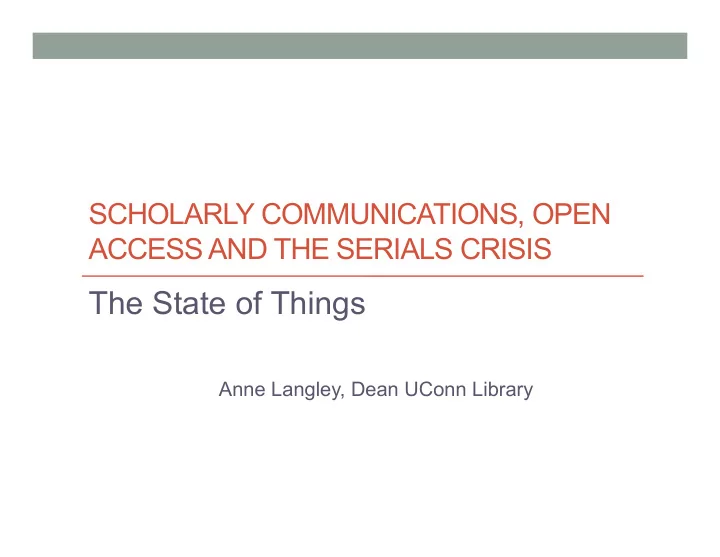

SCHOLARLY COMMUNICATIONS, OPEN ACCESS AND THE SERIALS CRISIS The State of Things Anne Langley, Dean UConn Library
The Serials Crisis The only way to make sense out of change is to plunge into it, move with it, and join the dance. Alan Watts
THE HARVARD LIBRARY : Faculty Advisory Council Memorandum on Journal Pricing Major Periodical Subscriptions Cannot Be Sustained To: Faculty Members in all Schools, Faculties, and Units From: The Faculty Advisory Council Date: April 17, 2012 RE: Periodical Subscriptions We write to communicate an untenable situation facing the Harvard Library. Many large journal publishers have made the scholarly communication environment fiscally unsustainable and academically restrictive. This situation is exacerbated by efforts of certain publishers (called “providers”) to acquire, bundle, and increase the pricing on journals. Harvard’s annual cost for journals from these providers now approaches $3.75M. In 2010, the comparable amount accounted for more than 20% of all periodical subscription costs and just under 10% of all collection costs for everything the Library acquires. Some journals cost as much as $40,000 per year, others in the tens of thousands. Prices for online content from two providers have increased by about 145% over the past six years, which far exceeds not only the consumer price index, but also the higher education and the library price indices. These journals therefore claim an ever-increasing share of our overall collection budget. Even though scholarly output continues to grow and publishing can be expensive, profit margins of 35% and more suggest that the prices we must pay do not solely result from an increasing supply of new articles. The Library has never received anything close to full reimbursement for these expenditures from overhead collected by the University on grant and research funds
The present economic model for dissemination of scholarly communication Source: Stuart Shieber, Harvard University, SPARC Open Access Meeting, Kansas City, MO, March 2012. http://www.sparc.arl.org/news/sparc-2012-open-access-program-and- speaker-slides.
The Rise of the Open Access Movement Nothing has more strength than dire necessity. - Euripides
What’s next? When it comes to the future, there are three kinds of people: those who let it happen, those who make it happen, and those who wonder what happened. John M. Richardson
Recommend
More recommend